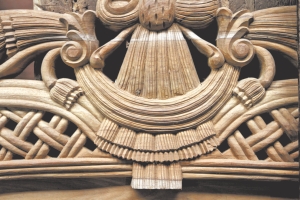| Home - Back Issues - The Team - Contact Us |
 |
| Volume 11 |Issue 04| January 27, 2012 | |
|
|
Economy The Mirpur Furniture Cluster Sharmin Ahmed
When one walks along the pavements of Rokeya Sharani, it is amazing to see the number of furniture shops with their elaborately designed furniture in completely furnished displays one after the other, standing in a long line. However what seems to catch the eye is the tendency of many shops owners to decorate their stores exactly like one of their bigger counterparts, so that it becomes quite easy to confuse the two. It is even stranger when one realises these stores are very similar to other well-known local furniture shops. Moshiur Rahman, who is the Marketing Director of Hatil a well known furniture company says, "In essence, there are only a handful of local well known brands of furniture, but here, it is quite easy to have a common misconception that almost all these grandly decorated shops are well known brands." In 1989, a few prominent furniture shops set up their showrooms at Rokeya Sarani at Mirpur and then one by one more shops accumulated. In time, Royeka Sarani came to house one of the biggest furniture clusters not only in the country, but as is claimed; in South-Asia. Mofiq Miah, who works at one of the local retails, says; "We are often given orders to make a specific piece of furniture with particular designs and size by a larger company, and they are usually sent abroad". The owner of the retail however refused to name the manufacturer because it may result in orders not coming to them. "We are under oath to maintain business confidentiality,” he says wishing to remain anonymous. Not only are showrooms and retail shops situated in the cluster, but quite a number of furniture factories are situated right behind these retailers. These are the small manufactures that have only one retail shop unlike the bigger brands that have their show rooms all over the country. The Mirpur cluster is a mutually beneficial market which has a three fold benefit for all who are situated here. Smaller shops mainly retailers' benefit from the big manufacturers who help them by assisting them to set up chain retails and showrooms of their furniture. The larger manufactures benefit from the need to make order-specific yet small-sized pieces which are also limited in number. These require specialised skills. Moreover, they both benefit from having a larger amount of sales as more customers are attracted to the cluster for the range of choice, price, and product offered all in one location.
Nonetheless, there is no denying that this cluster, if properly nurtured would be able to emulate world renowned furniture clusters like those of Bali and Je Para, Indonesia. And if looked at from a macro viewpoint, will contribute to the country's export base. This is something crucial given the situation of our dwindling foreign-exchange reserves and experts advice to diversify on export products. The Mirpur furniture cluster is dominated by small and medium scale manufacturers and also has a few big names such as Hatil, Otobi, Brothers, Navana, Partex and Akhter to name a few. Roughly, it is said to contribute 35 percent of the entire revenue made by the furniture industry in Bangladesh. It is a prime location for furniture purchases since both small and large retailer and manufacturer have their showrooms set up there.
In 2005, when a multi-donor funded development project Katalyst, first visited here, this was a large strip of space with many shops selling furniture, most of them making a satisfactory amount of profit. However, what was clear was that the cluster offered durable and quality wooden furniture, mostly with traditional patterns and motifs, at a higher price than the average market rate. moreover, manufacturers are unable to tap into the market opportunities that large firms often take advantage of. This is mostly because they failed to produce the necessary incentives that would act as a demand puller. A cluster furniture fair in 2005, organised by Katalyst and the Bangladesh Furniture Industries Owner's Association (BAFIOA) held on March, 2006, on first impact attracted as many as 10,000 visitors. Total sales during the festival were accounted to be Tk70 million which was 35 percent higher than the usual sales in the same period. The festival received rave reviews in mass media, both at local and international levels. Since then there have been quite a number of fairs and furniture festivals that have taken place. Moshiur Rahman also says that, "Hypothetically speaking, it could be said that this cluster holds the capacity of generating Tk 400 million per month. This amount will be higher in the peak season (wedding/ winter season)." In terms of exports, the furniture sector has only been able to make only SME level exports, meaning in small specific orders. "Our main competitors are China, Malaysia, and Indonesia" says Moshiur Rahman. It is in this part of the market that the government has a role to play because countries like China can offer their product at a very cheap price. If the government supports and nurtures this industry, like it helps the RMG sector, it will obviously bring significant benefit and help it rise to be an export industry in the economy. With the EXPO2012 which is an international furniture fair, about to take place on the 24-26, April 2012 here in Bangladesh, it is high time the government and the economy work towards using its opportunities to grow bigger in the international market. The Mirpur furniture cluster could be where the change begins. Copyright
(R) thedailystar.net 2012 |


